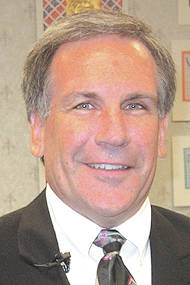
As I watched the moving tributes heaped upon former President George Herbert Walker Bush (aka “41”) after his recent passing, I was not surprised to learn of his athletic success as a young man. The attributes that endeared him to so many, such as his ultra competitive spirit and intensity; his love for and loyalty to family and friends; his ability to be single-minded in his approach to problem solving; his habit of deflecting praise to others when things went well, but accepting blame when they didn’t; and his humility, are all attributes that the most successful athletic programs reinforce.
As family, friends and foes alike declared their admiration for the attributes “41” exhibited on a daily basis, I was reminded of my own father, who also grew up during “The Greatest Generation.” While he didn’t fight in World War II, he has the same values as “41” did, and he did his best, together with my incredible mother, to pass them on to their children, just as President Bush did.
Dad viewed humility as a very important attribute for one to possess. In fact, one of my earliest memories in athletics came when he advised me, “If you’re good at something, you don’t need to tell people about it. They’ll be able to see it without you saying a word.”
That was his way of saying, “Just keep your mouth shut and play.”
Athletes who insist on prancing, preening, taunting and trash talking every time they make even an average play cheapen the game. Professional athletes are the worst at this. The pounding on the chest, pointing at the name on the back of their jersey, or standing over a vanquished opponent, as we see exhibited so often on television today, all seem like such “look at me!” actions that the most successful people among us don’t exhibit. These days, it is often hard to tell which team is winning or losing, since the behaviors are exhibited by players of both teams.
I sat dumbfounded a year or two ago when I heard studio analysts on an NFL pregame show debating the actions of a wide receiver who had caught a touchdown pass. He had gotten down on all fours by the goal post and had lifted his leg, pretending to urinate like a dog.
During the discussion, a couple of the announcers blamed the NFL for this disgraceful performance, because it hadn’t stipulated clearly enough what was and wasn’t acceptable celebratory behavior.
Are you kidding me? It was the league’s fault? Of course, one of the media members engaging in the debate was a former NFL player who, during his career, upon scoring a touchdown once pretended to pull his pants down and rub his butt on the goal post. Enough said.
Suffice it to say that pretending to urinate on a gym floor, acting as if I was dropping my pants, or taunting an opponent never was an option for me as a player. This wasn’t because my coach or the league I played in had sent me a memo telling me how I should behave. It was because I knew that had I ever done so, my father would have come out on the floor, during the game, snatched me by the ear, and escorted me off the floor in front of God and country.
And, that is exactly how it should be.
Similarly, when an all-pro quarterback recently criticized his teammates in the media, there was much debate about whether or not it was proper for him to have thrown his teammates under the bus, especially given that he had thrown a terrible interception at game’s end. In response to the criticism he received, the quarterback suggested that he had earned the right to publicly critique his teammates’ performance because of his long and successful playing career.
This “you have now earned the right to publicly call out your teammates,” was another lesson my dad and the coaches for whom I played forgot to impart upon me. Bush’s parents and coaches must have omitted that advice, too, considering that during his eulogy he was described as a man who, “In victory, he shared credit. When he lost, he shouldered the blame.”
That’s what the best teammates do.
All former athletes, in the end, become old and washed-up, incapable of performing the physical feats that once came so naturally. For most of us, this occurs in our late teens or early ’20s. Even the best athletes in the world are most often finished with their physical feats by the time they are 40.
So, if we don’t take something from a game besides playing a game, what’s the point?
The personal attributes that President George Herbert Walker Bush exhibited throughout an incredible lifetime and well after he had been confined to a wheelchair, with his baseball skills but a faint memory, are the skills that matter most. The members of “The Greatest Generation” seemed to understand that better than most.
We could all probably learn a thing or two from them.
Tom Dunn is a former superintendent of the Miami County Educational Service Center.


